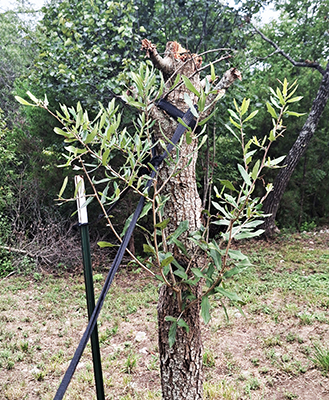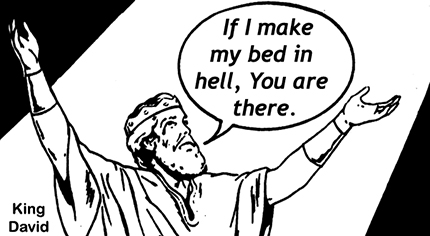 It was dead. The summer heat of Texas had killed the tree I’d planted in my yard. All the leaves were brown after not being watered while I was away for a few weeks. I was both mad and sad—not only because of what it had cost me to have it planted, but also because I’m “a tree person,” the way some people are cat or dog people.
It was dead. The summer heat of Texas had killed the tree I’d planted in my yard. All the leaves were brown after not being watered while I was away for a few weeks. I was both mad and sad—not only because of what it had cost me to have it planted, but also because I’m “a tree person,” the way some people are cat or dog people.
I kept watering the other new trees after I returned. But the dead one I simply forgot about. Then, after a few rains, to my surprise I saw green shoots poking out of its trunk, below where the main branches had been. Evidently there had still been life in the roots underground, even though everything above ground was completely dead. That really surprised me.
And I couldn’t help but see a spiritual parallel. Jesus of Nazareth said to some people in the book of Revelation, “You have a name; you live and are dead” (Revelation 3:1). Can you be both? How does that work?
I believe this sadly describes the condition of many people. They appear to be utterly dead spiritually—no leaves, no fruit, seemingly lifeless to the things of the Lord, even if they were once alive in Him to some degree.
I know a lot of people like this but I won’t name names. They give every impression of being estranged and indifferent to anything about God or Jesus. Often, they’ll even make sarcastic remarks if the subject comes up.
For believers, this can be discouraging—especially if they remember what that person used to be like. There’s just something heavy about death, even when it’s in “the living dead,” as Jesus described in Revelation 3.
 But I’m convinced there’s often more going on than what we see. King David wrote to God, “Where shall I go from Your Spirit, or where shall I flee from Your presence? If I ascend into heaven, You are there. If I make my bed in hell—behold, You are there” (Psalm 139:7–8).
But I’m convinced there’s often more going on than what we see. King David wrote to God, “Where shall I go from Your Spirit, or where shall I flee from Your presence? If I ascend into heaven, You are there. If I make my bed in hell—behold, You are there” (Psalm 139:7–8).
I think some of these “dead trees” believe they’re utterly separated from the Lord. But God is bigger than us—older, wiser, kinder, and far more powerful. An obscure verse in the Old Testament says that God devises ways “so that His banished ones are not expelled from Him” (2 Samuel 14:14).
It’s tempting to give up hope on people like this, just as I gave up on my tree. Even Jesus told the parable of the barren fig tree: after three years without fruit, the order was given to cut it down. But the gardener pleaded, “Leave it alone for one more year; I’ll dig around it and fertilize it. If it bears fruit next year, fine. If not, then cut it down” (Luke 13:7–9).
That tree in my yard has been a lesson to me about the goodness and greatness of God. “If our heart condemns us, God is greater than our heart and knows all things” (1 John 3:20). Our own hearts condemn us because of sin, but God is greater than our sinful nature. Even though my tree looked dead, unseen life was still in the roots. And by God’s hand, it sprang back.
 I believe He can do the same with people. Scripture is full of stories of those who were spiritually—and sometimes even physically—dead, yet returned to life through God’s mercy. The prodigal son was, for all intents and purposes, dead to the life he once had. But when “he came to himself,” he returned to his father, who welcomed him with open arms (Luke 15:11–32).
I believe He can do the same with people. Scripture is full of stories of those who were spiritually—and sometimes even physically—dead, yet returned to life through God’s mercy. The prodigal son was, for all intents and purposes, dead to the life he once had. But when “he came to himself,” he returned to his father, who welcomed him with open arms (Luke 15:11–32).
The lesson for me is simple: Have faith in God. If that dead tree in my yard could still have life hidden in its roots, then those who are “alive yet dead” can also be restored by the undeserved, overwhelming, omnipotent power of God. “With God, nothing shall be impossible” (Luke 1:37).

Very true! God does not lose those who were once saved. They are his forever.